Supporting Caregivers Through Hybrid Health Programs for Seniors
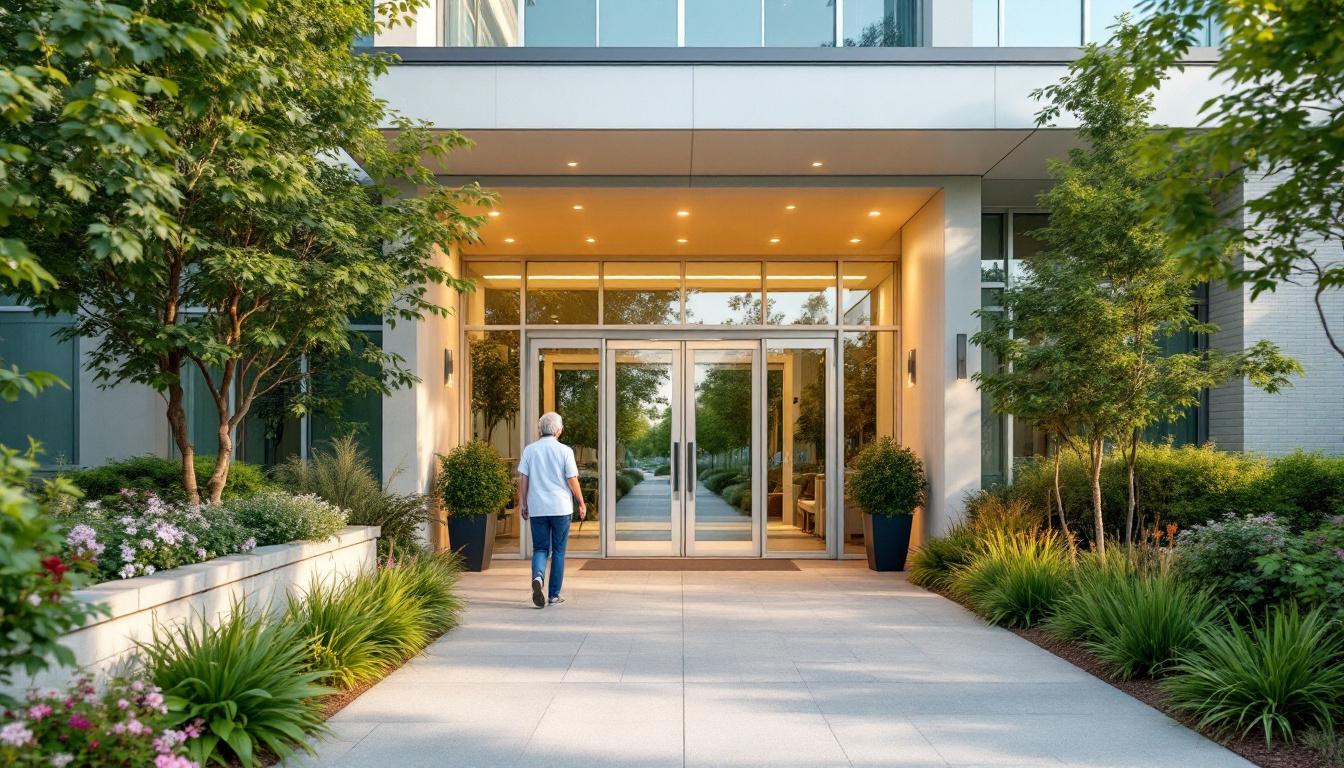
Enhancing Caregiving Experiences with Hybrid Healthcare Solutions
The evolving landscape of healthcare increasingly relies on hybrid programs that integrate digital technology with traditional services to support caregivers of seniors. These initiatives aim to address diverse needs, including those caring for individuals with dementia or Alzheimer’s, by providing flexible, accessible, and evidence-based resources designed to improve both caregiver well-being and senior health outcomes.
Features and Components of Hybrid Health Interventions for Caregivers
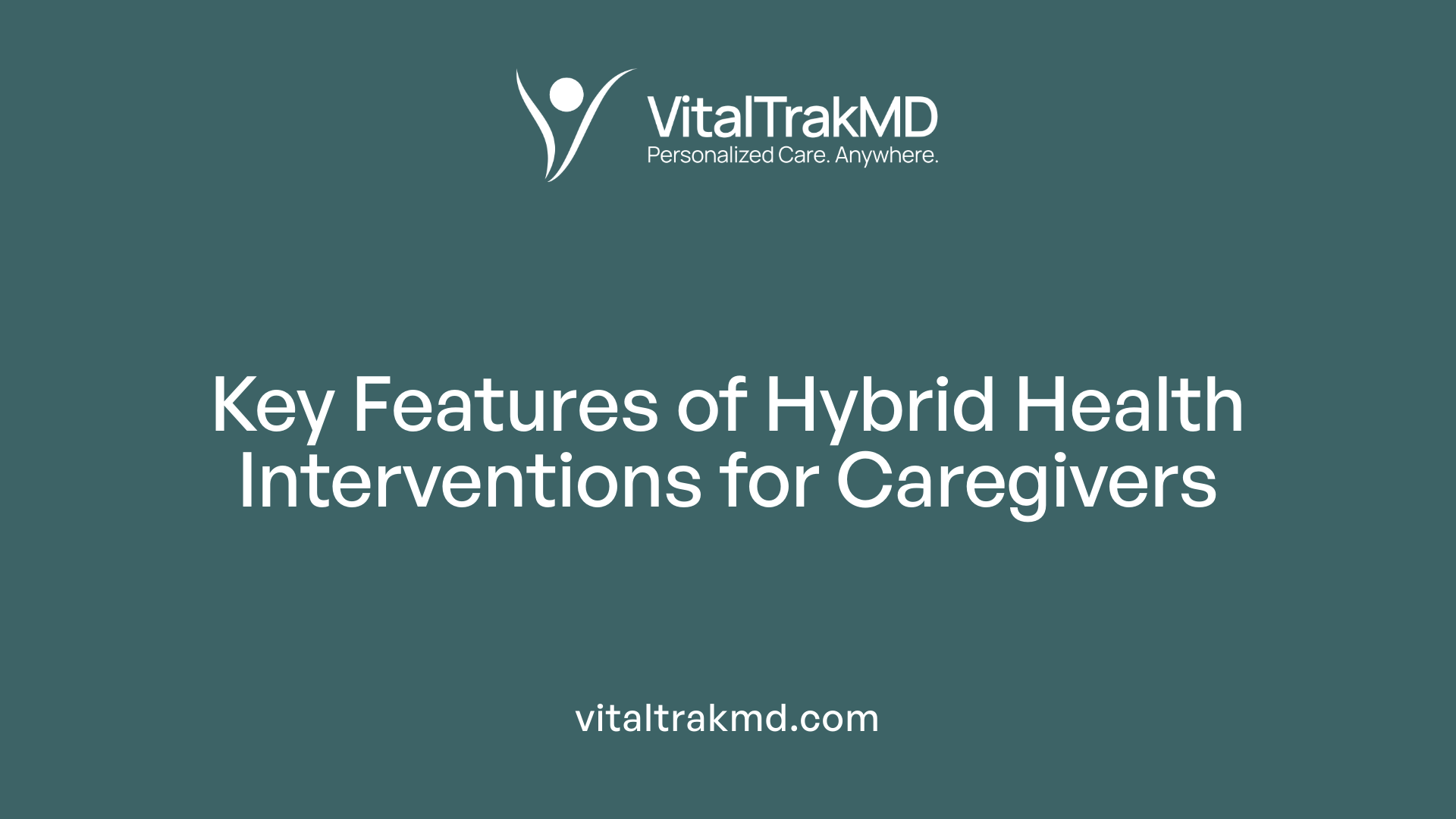 Hybrid health interventions combine digital tools with in-person activities to provide comprehensive support for caregivers of older adults. These programs often include the integration of modern teleconferencing technologies, such as high-quality devices like the Meeting Owl, which enhance virtual participation with excellent audio-visual capabilities. This setup allows caregivers to access social support, educational resources, and engaging activities from their homes.
Hybrid health interventions combine digital tools with in-person activities to provide comprehensive support for caregivers of older adults. These programs often include the integration of modern teleconferencing technologies, such as high-quality devices like the Meeting Owl, which enhance virtual participation with excellent audio-visual capabilities. This setup allows caregivers to access social support, educational resources, and engaging activities from their homes.
Tailored caregiver training modules are a vital part of these interventions. Evidence-based strategies involve customizing education based on individual caregiver needs, offering skill-building exercises like modeling techniques, and providing ongoing coaching or support through digital means. Participation in blended formats—both in-person and online—allows for flexibility and improves engagement, especially for those with mobility issues or in remote areas.
Supportive social and educational activities are crucial elements. Programs often facilitate connections to social networks, support groups, and educational sessions, fostering a sense of community and shared experience. These activities aim to reduce caregiver burden, improve their physical and mental health, and enhance caregiving skills.
High-quality teleconferencing technologies, such as the Meeting Owl, ensure that caregivers receive seamless, interactive experiences. These tools are essential for maintaining program fidelity, allowing real-time interaction and feedback, and fostering a sense of presence despite physical distances.
Are there evidence-based strategies for training caregivers within hybrid health programs?
Yes. Strategies include providing tailored education that addresses individual caregiver challenges, implementing active skill development exercises like modeling and practice, and offering continuous support via coaching or digital resources. Utilizing different training modalities—such as in-person, online, or a combination—helps meet diverse needs. Applying implementation science frameworks supports effective delivery, ensuring programs are scalable and sustainable, with ongoing evaluation of outcomes and processes.
In summary, combining personalized content, interactive skill-building, accessible digital platforms, and strategic implementation enhances the effectiveness of hybrid caregiver training programs, ultimately supporting better health outcomes for both caregivers and care recipients.
Implementation of Hybrid Health Programs in Healthcare Systems
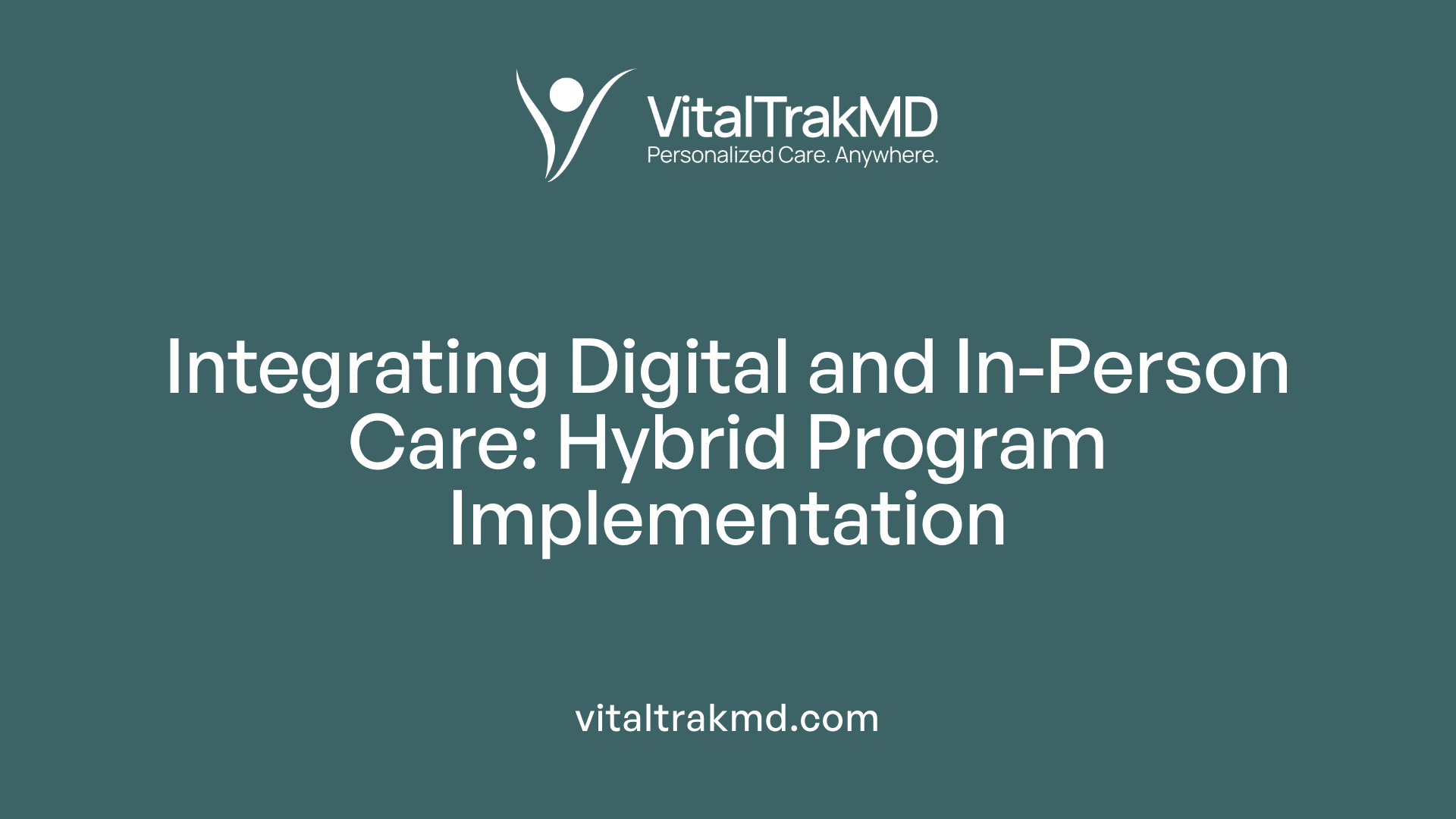
How are hybrid health programs implemented and adapted across healthcare systems?
Hybrid health programs combine traditional in-person care with digital technologies like telehealth, remote monitoring, and virtual consultations. This approach creates flexible pathways, allowing patients to switch smoothly between hospital visits, at-home care, and virtual interactions.
During the COVID-19 pandemic, many healthcare providers rapidly adopted remote services to maintain continuity of care. This quick shift highlighted the importance of integrating various technology platforms seamlessly into existing workflows.
Implementation involves developing infrastructure that supports both physical and virtual environments. For example, telemedicine platforms enable real-time video visits, while remote monitoring devices track patient health data outside clinical settings.
A collaborative, multidisciplinary approach is central to success. Teams including clinicians, IT specialists, and administrators work together to tailor solutions for specific medical fields and patient populations.
Challenges like data security and user engagement are actively addressed through secure systems and user-friendly interfaces. Training providers and patients ensures higher adoption rates and better experience.
Adapting these programs requires ongoing evaluation and flexibility to meet changing healthcare needs. Continuous improvement helps increase efficiency, reduce geographic and resource barriers, and improve overall patient outcomes.
In summary, hybrid healthcare models are evolving to become more resilient and accessible, blending technology with traditional care to better serve diverse populations.
Supporting Caregivers of Seniors with Dementia in Hybrid Models
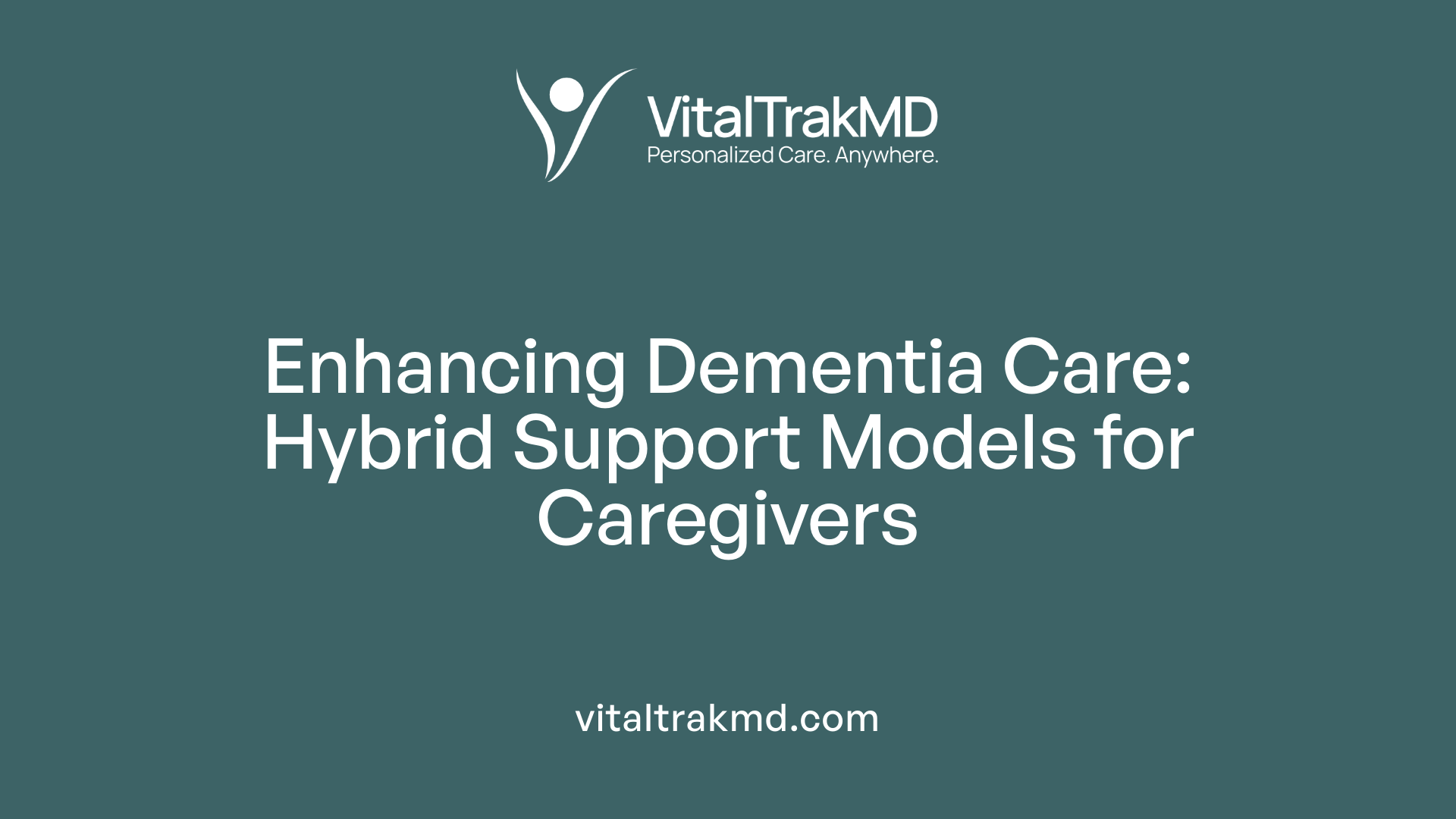 Hybrid care models provide a wide array of tailored support services for caregivers of seniors with dementia, emphasizing a combination of professional assistance, technology, and community resources.
Hybrid care models provide a wide array of tailored support services for caregivers of seniors with dementia, emphasizing a combination of professional assistance, technology, and community resources.
Caregivers have access to specialized training and education programs designed to enhance their skills in managing dementia-related challenges. These programs often include disease-specific education, practical caregiving skills, and confidence-building activities.
Utilizing telehealth and remote monitoring technologies is a cornerstone of these models. Devices and applications enable continuous safety monitoring, fall detection, and vital sign sharing, which help in timely intervention and reduce caregiver stress.
Community resources and in-home services are seamlessly integrated into hybrid models. These include respite care, adult day programs, and in-home support services that assist with personal care, medication management, and daily activities, allowing caregivers to take short breaks and preserve their well-being.
Technology-assisted safety and medical management further bolster care. Remote monitoring tools, emergency alert systems, and telehealth consultations enable seniors to stay safe and receive prompt medical attention when needed, directly supporting caregivers in supervising and responding to health issues.
Programs such as ADS Plus and COPE exemplify this integrated approach by offering disease-specific education, caregiver skills training, and care coordination. These initiatives aim to foster a better understanding of dementia, improve safety, and enhance the quality of life for both caregivers and seniors.
In summary, hybrid models streamline access to vital services—ranging from education and safety monitoring to community support—making caregiving more manageable and enhancing the care experience for families dealing with dementia.
Supporting Caregivers of Seniors with Alzheimer's and Related Disorders

What resources and support options are available for caregivers of seniors with dementia within hybrid models?
Caregivers of seniors with Alzheimer’s and related disorders can access a variety of support and resources through hybrid programs designed to adapt to individual needs. These programs often provide care consultation services that help caregivers plan and coordinate care effectively.
Dementia-specific information resources are available to educate caregivers about disease progression, safety, and management techniques. These are often complemented by caregiver education programs focused on developing skills to handle complex caregiving tasks.
Connections to community-based services are critical components, offering access to adult day centers, in-home support, and other local resources that promote seniors' independence and well-being.
Funding options are also available, such as grants for self-directed respite care, enabling caregivers to arrange for short-term relief. Technology plays a vital role, with telehealth, remote monitoring, and video conferencing helping to monitor health, provide medical advice, and maintain social connections.
Hybrid programs emphasize enhancing safety and reducing caregiver stress. They aim to keep seniors in their homes longer by supporting caregivers with practical tools and emotional support, ultimately fostering a higher quality of life for both seniors and their families.
Resources, Support Programs, and Policy Frameworks for Caregivers
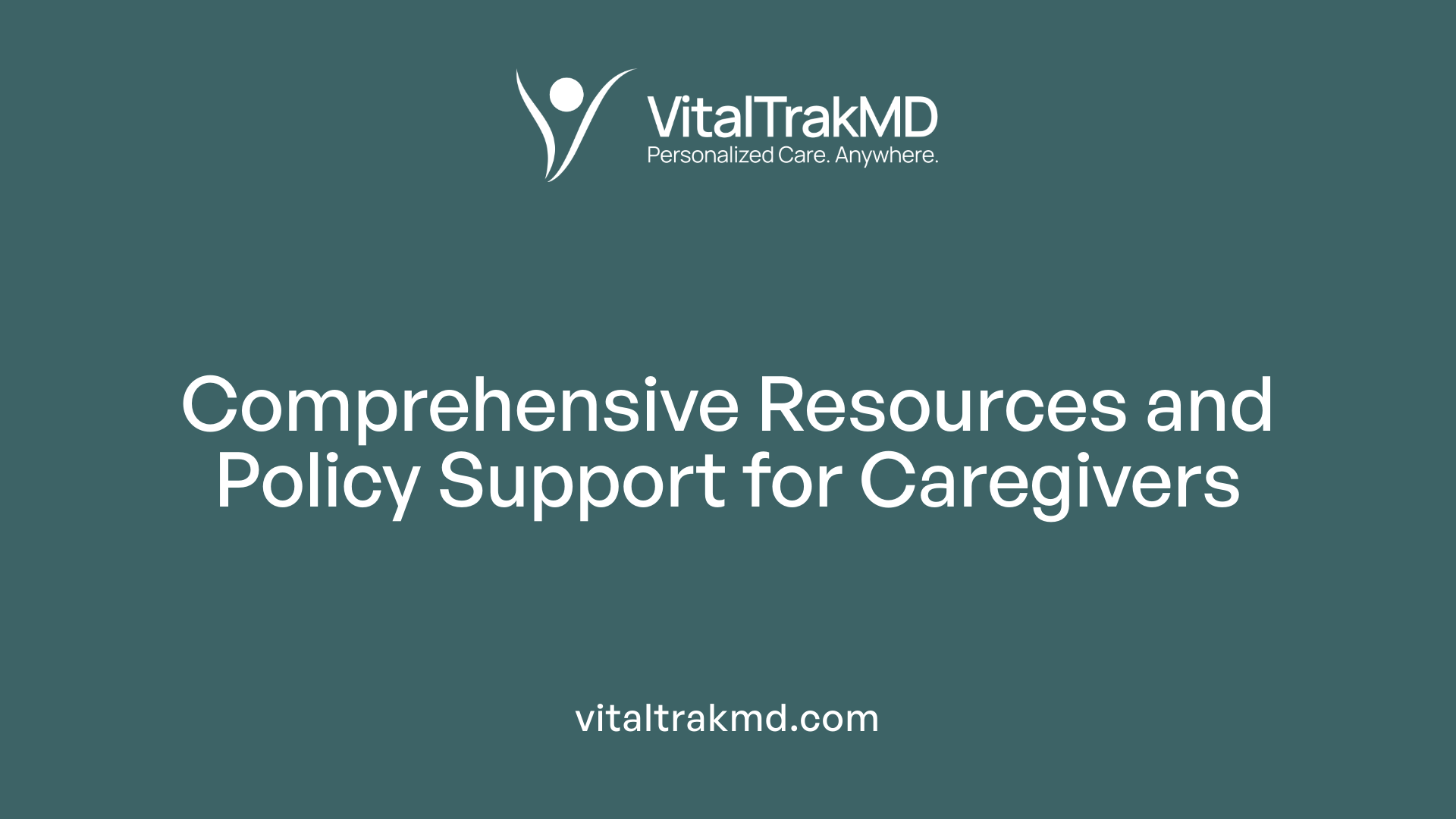 Caregivers have access to a broad spectrum of services and programs designed to support their challenging roles. These include federal initiatives like the National Family Caregiver Support Program (NFCSP), established in 2000, which provides grants to states for services such as information, counseling, training, and respite care. By 2014, over 700,000 caregivers benefited from NFCSP services, which have proven effective in enabling long-term home care, enhancing caregiving abilities, and reducing reliance on institutionalization.
Caregivers have access to a broad spectrum of services and programs designed to support their challenging roles. These include federal initiatives like the National Family Caregiver Support Program (NFCSP), established in 2000, which provides grants to states for services such as information, counseling, training, and respite care. By 2014, over 700,000 caregivers benefited from NFCSP services, which have proven effective in enabling long-term home care, enhancing caregiving abilities, and reducing reliance on institutionalization.
State-specific programs further supplement federal efforts. For example, North Carolina offers Project C.A.R.E., focusing on caregivers of individuals with Alzheimer’s and related dementias. This program provides care consultation, education, and financial assistance for respite care, connecting families to community-based resources and support networks.
At the VA, the application of the Replicating Effective Programs (REP) framework has expanded caregiver training. The iHI-FIVES program, delivered across multiple VA medical centers, promotes independence for Veterans through skill-building facilitated via virtual platforms, especially during COVID-19. Such initiatives have broadened access, leveraging technology to reach caregivers regardless of geographical barriers.
Additionally, Medicaid options like the Community Alternatives Program (CAP) allow individuals more control over their care and provide pathways for hiring personal caregivers. These programs support personalized, flexible care options aligned with individual preferences and needs.
Community and support network organizations play crucial roles as well. Resources such as the Eldercare Locator connect caregivers with local services like meal delivery, transportation, and home health, while tools like BenefitsCheckUp® help locate benefits that cover medication and food expenses. Support groups and counseling services offer emotional relief, and respite programs provide temporary care, granting caregivers necessary breaks.
Training services supported by policy initiatives, including online portals like CareLearn Washington, equip caregivers with essential skills for managing complex care situations. These resources assure caregivers they are not alone—connecting them to vital information, community services, and financial aides.
| Program or Resource | Focus Area | Supporting Agency or Organization | Contact/Availability |
|---|---|---|---|
| NFCSP (National Family Caregiver Support Program) | Education, Respite, Support | U.S. Administration on Aging | Nationwide, local offices |
| Project C.A.R.E. | Dementia-specific, Education | North Carolina Department of Health and Human Services | Regional offices across counties |
| VA Caregiver Training (iHI-FIVES) | Skill-building, Virtual access | Department of Veterans Affairs | Multiple VA sites |
| Eldercare Locator | Local community services | U.S. Administration on Aging | 1-800-677-1116 |
| BenefitsCheckUp® | Financial benefits for expenses | Aging & Disability Resource Centers | Online tool |
These programs exemplify a comprehensive, policy-supported landscape designed to bolster caregiver capacities, reduce burden, and promote sustainable, personalized care.
Building a Sustainable Future for Caregivers and Seniors
Hybrid health programs are revolutionizing caregiver support by offering flexible, comprehensive, and evidence-based solutions tailored to diverse needs. By integrating technological innovations with traditional services, these programs enhance safety, promote independence, and alleviate caregiver burden. Continued collaboration among healthcare providers, policymakers, community organizations, and technology developers is essential to expand access, improve efficacy, and ensure equitable support for all caregivers. As these programs evolve, they hold promise for enabling seniors to live healthier, more connected lives while giving caregivers the resources and confidence they need to provide quality care sustainably.
References
- mHealth Interventions to Support Caregivers of Older Adults
- Hybrid Programming Supports Older Adults and Caregivers
- Family Caregiver Support Program - NC DHHS
- Replicating an effective VA program to train and support family ...
- Caregiver Support Groups | Trinity Health System
- National Family Caregiver Support Program - ACL.gov
- Project CARE (Caregiver Support) - NC DHHS
- Caregiver Support - National Council on Aging
Recent articles
Want to Feel Better and Live Healthier?
Join hundreds of patients taking control of their health with personalized care that fits their life – not the other way around.
Rated 4.8/5 by 32+ customers







